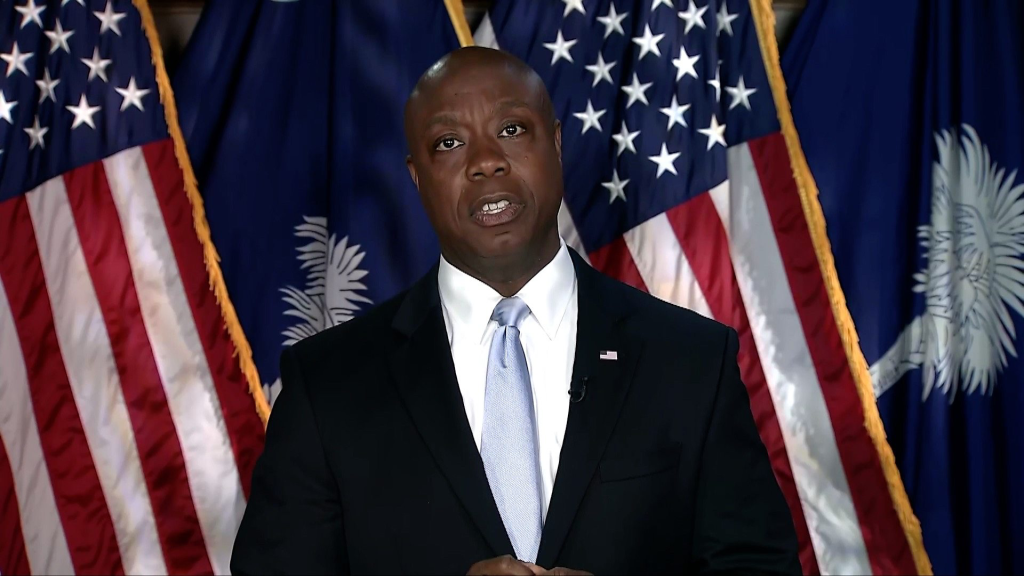Recently, Senator Tim Scott has been in the news, claiming America “isn’t a racist country” while simultaneously being lambasted for speaking out against Chicago leadership in light of the latest violence. Through this bold statement, Tim Scott opened many doors to public debate, diverse views on race relations, and how to run cities.
In this post, we will cover Tim Scott’s statement, the reactions that the posts drew, and the broader implications for how the nation discusses race and violence.
Tim Scott ‘s Statement
In one of his television interviews, Tim Scott categorically concurred that America “isn’t a racist country.” He declared his firm belief that just like the country historically grappled with issues of racism, a lot had changed. Scott referred to his own experiences as a black man rising to become the U.S. Senator to prove what all Americans, regardless of color, can achieve.
Tim Scott made this statement at a time when systemic racism and questions of equality topped the list of national discussions. In saying that America “isn’t a racist country,” Scott is trying to change the narrative to one of recognizing what has been done, while pointing out much of the remaining work.
Criticizing Chicago Leadership
Still, in the same interview, Tim Scott spoke about violence in Chicago. He laid the blame on Chicago’s leadership, citing that with its policies and governance, it has failed to do something about this senseless violence that has plagued the city. Scott also pointed out the alarming rates of homicides and violent crimes, suggesting ineffective leadership and misguided policies are to blame.
Tim Scott’s rebuke of the Chicago leadership was based on his premise that stout, effective governance is the way to go for the delivery of safety to people and wellness of communities at large. By blasting Chicago leadership over violence, Scott is calling for accountability, a revisiting of strategies meant to fight crime, and to advance safety.
Reactions to Tim Scott ‘s Remarks
Tim Scott’s speech drew a sea of different reactions. Many are in high praise for his optimistic view of America and calling for an improvement in governance in places such as Chicago. They feel, therefore, that Scott’s view is one which will act as the correct antidote against pessimistic views and pave the way for inspiration into progress and opportunity.
However, the criticism argues that such a declaration made by Tim Scott that America “isn’t a racist country” was an oversimplification of what is otherwise a rather complex and long-running story involving systemic racism.
One ought to, they argue, have known a way to give credit for progress without undermining an important recognition of and actions against deep-rooted racial inequalities. Some of them also believe Scott’s attack on Chicago’s leadership serves as a distraction from larger socioeconomic factors contributing to urban violence.
The Broader Debate

Tim Scott’s statement and critique have yet again reached the broader debates about race, governance, and public safety in America. His insistence that America “is not a racist country” pushes narratives almost entirely centered on systemic racism toward a call for personal agency and life opportunities within the country.
On the other hand, criticism of Chicago’s leadership raises some pertinent questions related to local governance efficiency in dealing with urban violence. It underlines measures for comprehensive strategies beyond policing to economic development, education, and community offerings.
Implications for National Discourse
Tim Scott’s comments have big implications for the conversation on race and violence at the national level. By proclaiming that America “isn’t a racist country” and blasting Chicago leadership over the level of violence, he affected the frame through which these issues are cast and discussed. His perspective puts emphasis on progress and opportunity but demands accountability in governance.
Tim Scott’s statement raises an important debate, one of the main tenets of which is the great use that diverse perspectives bring to the formation of public policy and social attitudes. It shows that more dialogue is needed for such complex problems to be resolved, not just talking but also listening to others.
Senator Tim Scott said America “is not a racist country,” and he blasted Chicago leadership over violence. These are important conversations dealing with race and governance in the United States. Though this earned him both praise and condemnation, his comments do illustrate that at a fundamental level, these are issues that have to be addressed from these two different directions.
The perspectives brought forward by leaders like Tim Scott are vital as America wrestles with her past, present, and future. Whether one agrees or disagrees with his views, the contribution that Tim Scott has brought to the forefront really reminds one that much work lies ahead of us to forge a just and fair society. His call for looking forward, acknowledging the progress while seeking the following steps, has made important input into the discourse on the way forward for America.





